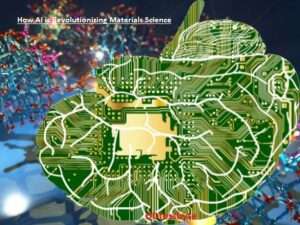Materials science, the field that explores the properties and applications of substances, is undergoing a significant transformation thanks to the integration of Artificial Intelligence (AI). This powerful synergy is not only accelerating research but also opening up new possibilities in the development of innovative materials. In this article, we will delve into how AI is reshaping the landscape of materials science.

Artificial intelligence (AI) is rapidly transforming many industries, and materials science is no exception. AI is being used to accelerate the discovery and design of new materials with improved properties, such as strength, durability, and sustainability.
Materials Science Meets AI
Materials science involves the study of various materials, from metals and polymers to ceramics and composites, with the goal of understanding their behavior and finding novel applications. AI, on the other hand, is all about simulating human intelligence in machines. When these two fields converge, magic happens.
Accelerating Discovery
Traditionally, materials discovery was a painstakingly slow process, often involving trial and error. AI has turned this scenario on its head. Machine learning algorithms can analyze vast datasets, predict material properties, and even propose new combinations of elements that might exhibit desired characteristics. This speeds up the discovery process exponentially.
Designing Custom Materials
AI enables the design of materials with tailor-made properties. Researchers can input specific requirements, such as exceptional strength or high thermal conductivity, and AI algorithms can suggest material compositions that fit the bill. This has revolutionary implications for industries ranging from aerospace to electronics.
Predicting Material Behavior
Understanding how materials behave under various conditions is critical. AI-driven simulations can predict material responses to stress, temperature, and other factors with remarkable accuracy. This helps engineers and scientists make informed decisions about material selection for specific applications.

Reducing Costs
The high cost of experimentation and testing is a significant barrier in materials science. AI minimizes these costs by identifying the most promising materials and reducing the need for extensive physical testing. This not only saves time but also resources.
AI in Action
One notable application of AI in materials science is the development of advanced alloys. By simulating the behavior of different alloy compositions under extreme conditions, scientists can create materials that withstand the harshest environments, a game-changer for the aerospace and automotive industries.
The Future of Materials Science
As AI continues to evolve, its role in materials science is only set to grow. Researchers are exploring AI-powered tools for designing materials with unique optical, electrical, and magnetic properties. This opens up exciting possibilities in fields like photonics and quantum computing.

Here are some of the ways that AI is being used in materials science:
- Data mining: AI can be used to mine large datasets of materials data to identify patterns and relationships that would be difficult to find manually. This information can then be used to design new materials with desired properties.
- Machine learning: AI can be used to train machine learning models to predict the properties of materials from their chemical composition and structure. This can help to accelerate the design process and reduce the need for costly and time-consuming experiments.
- Simulation: AI can be used to simulate the behavior of materials under different conditions. This can help to predict how materials will perform in real-world applications, such as in engines, batteries, and medical devices.
- Optimization: AI can be used to optimize the design of materials for specific applications. This can help to find the best combination of materials properties for a given application.

One such emerging domain for AI adoption is materials science. AI tools are automating time-consuming tasks, including identifying relevant research references and potential compound ingredients. Researchers are also leveraging AI to discover new materials and optimize existing ones.
Researchers at the University of Liverpool have developed an AI tool to discover new materials by analyzing the relationships between hundreds of thousands of known materials. This approach has led to the discovery of four new solid-state materials with promising implications for battery technologies.
These examples highlight the rapid adoption of AI in materials science, with applications ranging from corrosion-resistant coatings to renewable energy materials. As AI-enhanced materials research becomes more established, it will address various critical needs, including biodegradable materials, improved resource efficiency, and materials capable of withstanding extreme conditions.

The fusion of AI and materials science is transforming the way we discover, design, and utilize materials. This synergy not only accelerates research but also unlocks new frontiers in material properties and applications. As AI technology continues to advance, we can expect even more groundbreaking innovations to emerge from this dynamic partnership. The future of materials science is brighter and more exciting than ever before, thanks to the power of AI.
